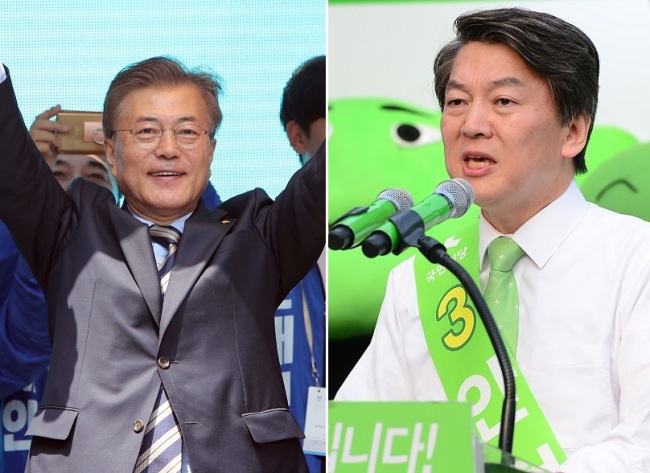The Korea Herald is publishing a series of articles that try to capture the voter sentiment in key regions. The following is the fourth installment on Gwangju and South and North Jeolla Province, a traditional liberal stronghold. -- Ed.Honam, referring to the liberal-leaning Gwangju and Jeolla provinces in the nation’s southwest area, has always played a pivotal role in South Korea’s presidential elections, keeping a balance with the largely dominant conservative camp.
But in this year’s election, the region is deemed one of the biggest swing voter pools, undecided on whether to remain a stronghold for the main liberal camp or to divert its loyalty to a new, centrist political cluster.
The dilemma of voters there is that they no longer wish to be taken for granted as a progressive home turf, but are still reluctant to show allegiance to a relatively centrist-conservative alternative.

Moon Jae-in of the liberal Democratic Party of Korea (left) and Ahn Cheol-soo of the centrist-left People’s Party (Yonhap)
Vying for the upper hand in this key region are the two presidential front-runners -- Moon Jae-in of the liberal Democratic Party of Korea and Ahn Cheol-soo of the centrist-left People’s Party.
“Many Honam voters would agree that the Democratic Party and its candidate Moon have done little in recent years to earn our support,” said Moon Jeong-hee, a 38-year-old engineer working in Gwangju.
“Perhaps we had been waiting for a valid political alternative, other than the old Democratic crew.”
For several decades, supporting the liberal camp -- which was most often the opposition -- was considered the only political choice for a region seeking to stand against conservative state powers and social polarization.
The Honam region, which has frequently complained of being left out from economic development, is home to the late liberal President Kim Dae-jung. The city of Gwangju, where the May 18 Democratization Movement took place in 1980 under the former Chun Doo-hwan administration, is dubbed the nation’s hub of democratization.
It was here that the main liberal party found its political identity, as well as the power to stand up to the conservative camp and the conservative-leaning Gyeongsang provinces and Busan in the southeastern part of the nation -- dubbed the Yeongnam region.
Due to such deeply-rooted connections, the Honam voters showed steady support to the main liberal party, including for the late President Roh Moo-hyun and his political heir Moon -- both born in Busan.
But it was during the 2016 parliamentary election that this liberal stronghold finally gestured at breaking off its long ties with the Democratic Party by casting a sweeping vote for the People’s Party.
Having kicked off some two months ahead of the election under the lead of Ahn and other former Democratic lawmakers, the group soon rose as the third-largest parliamentary negotiating group by winning 38 out of the 300 parliamentary seats. The key contributor to such a surprising achievement was the Honam region, where the newly formed party recorded victory in 23 out of 28 constituencies.
“The Democratic Party supporters blamed the People’s Party and the Honam voters for a number of reasons, some for causing progressive divides and others for promoting regionalism,” said Lee Jang-heon, a 59-year-old Jeonju citizen, adding he casted his ballot for the People’s Party last year.
“But in my case, (voting for the People’s Party) meant that I exercised my liberty to choose a candidate on his or her policies, not on a specific party affiliation.”
Voter sentiment favorable to Ahn and his party, however, has been faltering recently, partly due to how Ahn made conservative shifts in his key policies so as to appeal to the undecided centrist-conservative voter pool and expand his leverage.
According to a survey conducted by Korea Research last week, Moon garnered 55.1 percent of support in the Gwangju-Jeolla provinces, outrunning Ahn’s 31.6 percent. The gap was all the more conspicuous, considering the general anti-Moon tendency among local voters.
In particular, Ahn’s disagreement with a policy of the late former President Kim seemingly delivered a negative blow upon himself.
“I believe that (Kim’s Sunshine Policy for North Korea) had its pros and cons,” Ahn said in the second televised debate held Wednesday.
His critical view of the late former president’s key political legacy formed a contrast to Moon who reiterated his pledge to adopt a peaceful inter-Korean policy tone.
It was under these circumstances that leadership members of the party, especially party Chairman Rep. Park Jie-won, have recently been seeking to reach out to the liberal crowd there.
“It is candidate Ahn who shall become the second President Kim Dae-jung” said Park during a street campaign in Mokpo last Monday.
The fourth-term Honam lawmaker had changed his schedule at the last minute on the day to accompany Ahn in his provincial tour, in an apparent effort to keep the party’s turf amid falling support ratings.
By Bae Hyun-jung (
tellme@heraldcorp.com)






![[Graphic News] More Koreans say they plan long-distance trips this year](http://res.heraldm.com/phpwas/restmb_idxmake.php?idx=645&simg=/content/image/2024/04/17/20240417050828_0.gif&u=)